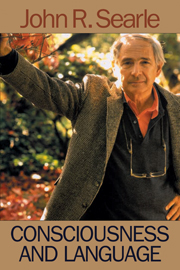Book contents
- Frontmatter
- Contents
- Introduction
- 1 The Problem of Consciousness
- 2 How to Study Consciousness Scientifically
- 3 Consciousness
- 4 Animal Minds
- 5 Intentionality and Its Place in Nature
- 6 Collective Intentions and Actions
- 7 The Explanation of Cognition
- 8 Intentionalistic Explanations in the Social Sciences
- 9 Individual Intentionality and Social Phenomena in the Theory of Speech Acts
- 10 How Performatives Work
- 11 Conversation
- 12 Analytic Philosophy and Mental Phenomena
- 13 Indeterminacy, Empiricism, and the First Person
- 14 Skepticism About Rules and Intentionality
- Name Index
- Subject Index
9 - Individual Intentionality and Social Phenomena in the Theory of Speech Acts
Published online by Cambridge University Press: 14 January 2010
- Frontmatter
- Contents
- Introduction
- 1 The Problem of Consciousness
- 2 How to Study Consciousness Scientifically
- 3 Consciousness
- 4 Animal Minds
- 5 Intentionality and Its Place in Nature
- 6 Collective Intentions and Actions
- 7 The Explanation of Cognition
- 8 Intentionalistic Explanations in the Social Sciences
- 9 Individual Intentionality and Social Phenomena in the Theory of Speech Acts
- 10 How Performatives Work
- 11 Conversation
- 12 Analytic Philosophy and Mental Phenomena
- 13 Indeterminacy, Empiricism, and the First Person
- 14 Skepticism About Rules and Intentionality
- Name Index
- Subject Index
Summary
Since the early work on speech acts by Austin, Grice, myself and others in the 1950s and '60s, it has been possible to distinguish two apparently inconsistent strands in speech act theory. One strand, most prominently associated with the name of Grice (1957, 1969), treats individual intentionality as the fundamental notion in the theory of speech acts. Meaning is created by individual acts whereby speakers attempt to produce effects on hearers by getting the hearers to recognize their attempt to produce those effects. Meaning is thus the product of individual acts of meaning. On a Gricean analysis, there is no suggestion that conventions, rules, or social practices are in any way essential for the performance of speech acts. A second tradition associated with the name of Austin (1962), as well as with my own early book Speech Acts (1969), emphasizes the role of social institutions in the performance of speech acts. On this view, social conventions, rules, and contexts of utterance play a crucial role in the determination of the speech act. Meaning, on this view, is not just a product of individual intentionality, but it is also the result of social practices.
Is there anything to be said for either of these approaches, and in particular, are they, or can they be made to be, consistent with each other? My own view is that if they are stated carefully they can be construed in a way which renders them consistent. I believe they are both trying to say something true.
Information
- Type
- Chapter
- Information
- Consciousness and Language , pp. 142 - 155Publisher: Cambridge University PressPrint publication year: 2002
Accessibility standard: Unknown
Why this information is here
This section outlines the accessibility features of this content - including support for screen readers, full keyboard navigation and high-contrast display options. This may not be relevant for you.Accessibility Information
- 1
- Cited by
